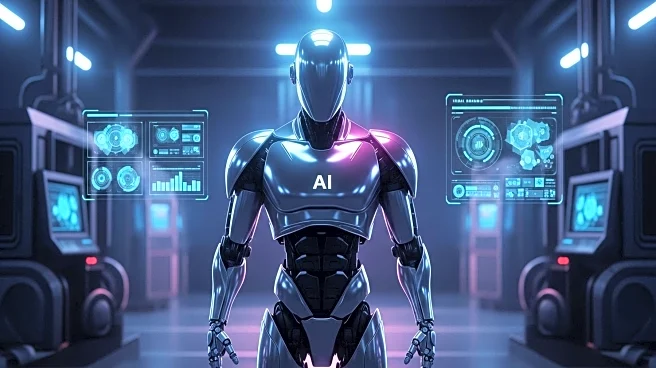What's Happening?
Manufacturers are increasingly adopting artificial intelligence (AI) to address cybersecurity threats, as highlighted in the latest State of Smart Manufacturing Report by Rockwell Automation Inc. The report identifies cybersecurity as a top business issue, second only to economic conditions, in the manufacturing sector globally. Cyber risks have evolved from a technology concern to a significant boardroom issue, prompting manufacturers to integrate AI and machine learning (ML) into their cybersecurity strategies. The report reveals that 61% of cybersecurity and IT professionals plan to adopt AI and ML for security within the next 12 months, surpassing general manufacturing adoption rates. Additionally, 48% of cybersecurity professionals emphasize securing converging IT/OT architecture as crucial for positive outcomes over the next five years.
Why It's Important?
The growing adoption of AI in cybersecurity is crucial for the manufacturing sector, which faces significant threats from cyberattacks due to the increasing integration of IT and operational technology (OT). As manufacturers continue to digitize their operations, the risk of cyber threats escalates, making robust cybersecurity measures essential for business continuity and growth. The emphasis on AI and ML highlights the sector's shift towards advanced technologies to safeguard against these risks. This trend not only impacts the manufacturing industry but also influences workforce development, as cybersecurity skills become a priority in hiring practices. The focus on AI-driven quality control further underscores the importance of maintaining product integrity and safety in a competitive market.
What's Next?
Manufacturers are expected to continue integrating AI and ML into their cybersecurity frameworks, with a focus on securing IT/OT architecture. As AI adoption accelerates, the industry may witness increased collaboration between cybersecurity teams and AI specialists to develop innovative solutions for emerging threats. Workforce development will likely prioritize cybersecurity and analytical skills, addressing the talent shortage in the sector. Additionally, manufacturers may explore AI applications beyond cybersecurity, such as supply chain management and quality control, to enhance operational efficiency and product quality.
Beyond the Headlines
The integration of AI in cybersecurity raises ethical and legal considerations, particularly regarding data privacy and the potential for AI-driven surveillance. Manufacturers must navigate these challenges while ensuring compliance with regulations and maintaining consumer trust. The long-term implications of AI adoption in manufacturing could lead to a paradigm shift in how industries approach cybersecurity, potentially setting new standards for digital infrastructure protection.









